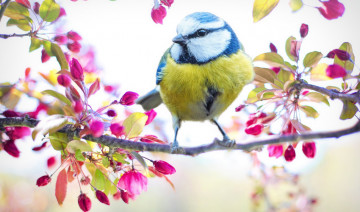
Springtime Wild Bird Care
Spring is a wonderful time of the year for bird lovers. The return of migratory birds and the increased activity of our resident feathered friends make it an exciting time to observe and care for wild birds. As the temperatures rise and the days grow longer, here are some wild bird care tips to keep in mind.
- Provide Water: Birds need fresh, clean water to drink and bathe in. As the weather warms up, it's important to make sure that your birdbath or water source is clean and refilled regularly. Consider adding a dripper or fountain to attract more birds to your backyard.
- Offer Nesting Materials: Spring is the time when many birds start building their nests. You can help them out by providing nesting materials such as twigs, grass, and feathers. You can place these materials in a small basket or mesh bag near your bird feeder.
- Offer a Variety of Food: Different birds have different dietary needs. Make sure you are offering a variety of food options such as seeds, suet, fruit, and mealworms. You can also offer nectar for hummingbirds and orioles.
- Keep Feeders Clean: Dirty feeders can spread disease among birds. Regularly clean your bird feeders with hot, soapy water and let them dry completely before refilling them with fresh seed.
- Protect Birds from Predators: Spring is also the time when many predators such as cats, hawks, and snakes are more active. Consider placing your bird feeders near bushes or trees where birds can hide, and keep your cats indoors.
- Avoid Pesticides: Pesticides can harm birds directly or indirectly by killing the insects that birds feed on. Consider using natural alternatives or using pesticides sparingly and according to the instructions.
- Monitor Bird Behavior: If you notice any unusual behavior such as lethargy, difficulty breathing, or disorientation, contact a local wildlife rehabilitator or veterinarian immediately.
By following these wild bird care tips, you can create a welcoming environment for our feathered friends during the spring season. Remember to observe and enjoy them from a distance, and always respect their natural behaviors and habitats.
